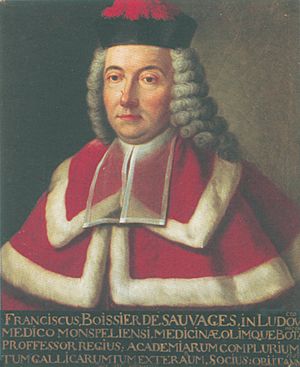François Boissier de Sauvages de Lacroix facts for kids
Quick facts for kids
François Boissier de Sauvages de Lacroix
|
|
|---|---|

François Boissier de Sauvages de Lacroix
|
|
| Born | May 12, 1706 |
| Died | February 19, 1767 (aged 60) |
| Nationality | French |
| Alma mater | University of Montpellier |
| Scientific career | |
| Fields | |
François Boissier de Sauvages de Lacroix (born May 12, 1706 – died February 19, 1767) was a French doctor and plant expert. He was born in Alès, France. His brother, Pierre Augustin Boissier de Sauvages, was also a naturalist, someone who studies nature.
Contents
Early Life and Studies
François de Lacroix studied at the University of Montpellier. There, he learned about botany, which is the study of plants. His teacher was Pierre Baux.
After finishing his studies, he spent a few years in Paris. In 1734, he returned to Montpellier. He became a professor, teaching about how the body works (physiology) and about diseases (pathology).
Improving the Botanical Garden
Later, he became the head of botany at the university. He made big improvements to the botanical garden in Montpellier. He even helped build its first greenhouse. This allowed them to grow plants that needed warmer climates.
Friendship with Carl Linnaeus
François de Lacroix was good friends with Carl Linnaeus, a famous Swedish naturalist. Linnaeus is known for creating a system to name and classify all living things.
Sauvages de Lacroix sent many plant samples from the Montpellier area to Linnaeus for study. Linnaeus honored his friend by naming a plant group, or genus, Sauvagesia, after him.
In 1748, Sauvages de Lacroix became a member of the Royal Swedish Academy of Sciences. Linnaeus had helped start this important group. The next year, he was also chosen as a Fellow of the Royal Society in London.
Classifying Diseases
As a doctor, Sauvages de Lacroix created a new way to classify diseases. This system was called a methodical nosology. It was similar to how botanists classify plants.
He organized diseases into 10 main groups. These groups were then divided into smaller categories. His system listed 295 types of diseases, with 2400 individual "species" of illnesses.
Nosologia Methodica
Sauvages de Lacroix explained his system in a book called Nosologia Methodica in 1763. This book was very important. It even inspired Philippe Pinel, another doctor, in his early research on mental illnesses.
Images for kids
 | John T. Biggers |
 | Thomas Blackshear |
 | Mark Bradford |
 | Beverly Buchanan |


